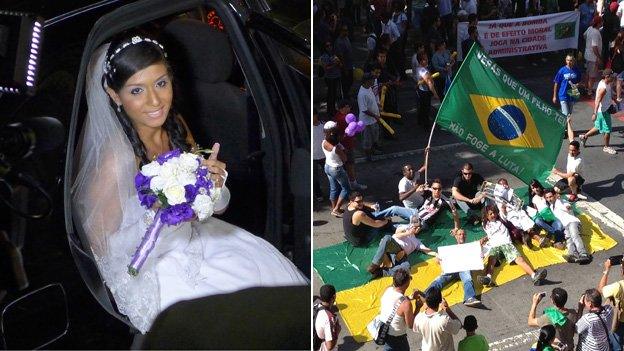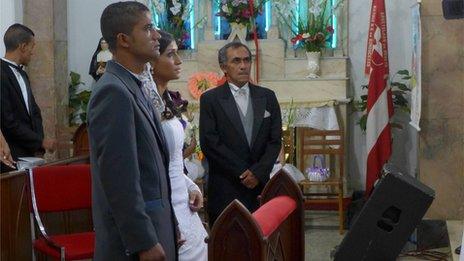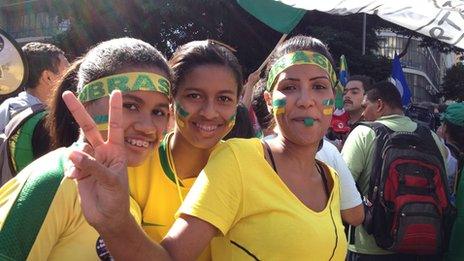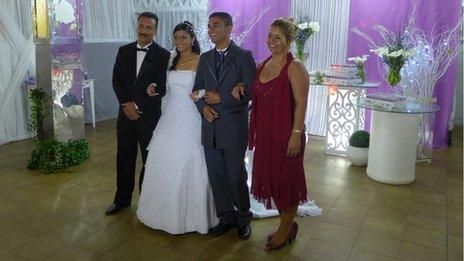Brazil's precarious new middle class demands more
- Published

Brazil's new middle class - celebrating and demonstrating
Brazil's so-called "new middle class" gained recognition worldwide as a symbol of upward mobility. But the wave of demonstrations that brought millions out on to the streets in June has exposed the thin line that separates this group from slipping back into poverty.
They had been planning the evening for more than a year. The groom waited anxiously in the fancy grey suit rented out for the ceremony; the bride arrived fashionably late in a shiny black car, with sparkles from her gown to her crown.
Francisco Oliveira and Taina Ferreira were married in a Catholic church close to Complexo da Mare, the shanty town where they live in Rio de Janeiro.
The proud groom is a 35-year-old construction worker kept busy in Brazil's booming property business. He says the money spent on the fancy ceremony was worth every penny.
"It was her dream, and making her happy makes me so happy too," he says.

Brazilians are spending 50% more on weddings than they did a decade ago
Like many in Brazil's new middle class, Francisco and 23-year-old Taina can afford luxuries their parents did not have.
More buying power among the so-called Classe C has meant people have more access to appliances, electrical goods and travel opportunities - but also the possibility of getting married in style, something people here cherish.
In the past decade, Brazilians have increased their spending on weddings by more than 50%.
'People want a say'
But in June, it became clear that having more access to goods and services was not enough.
Millions of Brazilians took to the streets in demonstrations that swept across the country during the Confederations Cup football tournament.
Julia Carneiro reports on Brazil's middle class
The protesters had many concerns, ranging from corruption in public life to spending on hosting the World Cup and Olympics. Much of the anger was driven by middle-class demands.
People were asking for more investment in public services, demanding better public schools, hospitals and transportation.
"The people have awoken," was one of the constant chants heard on the streets.
Jailson de Souza e Silva, who co-ordinates a non-governmental organisation (NGO) in Mare known as the Favela Observatory, says newcomers to the Classe C have been celebrated as consumers but they are now making more demands as citizens.
"It's great that people have more access to food and different goods. But people want to have a say in politics and a wider participation in decision-making."

Three Brazilians among the thousands protesting in June
Mr Silva says the Brazilian government has historically distanced itself from the needs of society.
"The population feels that the state takes a lot and gives very little back. Taxes are very high, but the return in terms of investment in health, education, housing and security is still very low."
Vladimir Safatle, a philosophy professor at the University of Sao Paulo, says there was a period of upward mobility during former president Luiz Inacio Lula da Silva's government, but now people feel this progress has stalled.
"We had a strong growth but we are not feeling a better quality of life. The middle class feels that its salaries are corroded by all the money they have to spend on private services, because public schools and hospitals are so poor."
'Basic needs'
Belonging to the middle class in Brazil is not what people may imagine in developed countries, says Renato Meirelles, director of research institute Data Popular.
Here, a family of four with a monthly income of more than $150 (£100) per person is considered part of this group.

"It seems low but the new middle class has seen its income improve a lot in the past few years," says Mr Meirelles.
The global middle class revolution
Of the 12 million people living in Brazil's favelas - or shanty towns - more than 60% now belong to this middle class.
"Of course there is still a long way to go. People in this group still have very basic needs, for instance when it comes to education and proper sanitation."
But Taina and Francisco are an example of a newer generation in Rio's favelas that is more aware of the importance of education and do not feel trapped by the impoverished lives their parents led.
Taina is the first person in her family to go to university - she is a chemistry student at Rio's Federal University.
Initially she dreamed of getting a stable job but now sees a wide range of opportunities - and her new husband Francisco wants to follow in her footsteps.
"Things are changing. Most of the people in my community now want to go to college. I think we've taken a big step forward," she says.
First steps
After the religious ceremony, Francisco and Taina arrive, now together, at their wedding party.
It's in a party venue in the working-class neighbourhood of Ramos, close to Mare. It's modest but luxurious, with purple and white curtains hanging from the walls, matching flowers and drapery on the tables. The three-tiered wedding cake has a miniature bride and groom on top.

Francisco and Taina saved $4,000 for their wedding
The young couple saved $4,000 (£2,600) to throw this party and invited more than 100 friends and relatives. There is plenty of food, drink and even a folk dance, a tribute to Brazil's traditional Festa Junina (June Festival) celebrations.
The men put on straw hats and line up in pairs with the women. The married couple duck down to scoot through a tunnel formed by the raised arms of their guests.
These are their first steps as a married couple but they have many ambitions for the future and a growing sense that the mobility which brought them into the new middle class needs to continue.